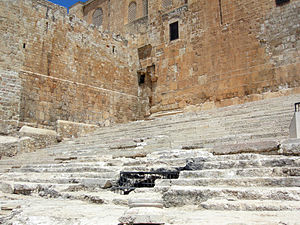| Zealot Temple siege | |||||||
|---|---|---|---|---|---|---|---|
| Part of the First Jewish–Roman War | |||||||
 Excavated remains of staircase from the Temple in Jerusalem, May 2009 | |||||||
| |||||||
| Belligerents | |||||||
|
Edomites | |||||||
| Commanders and leaders | |||||||
|
Zealots: Edomites: John Jacob ben Sosa Simon ben Cathlas Phineas ben Clusothus |
Joseph ben Gurion † Ananus ben Ananus † | ||||||
| Strength | |||||||
|
Unknown number of Zealots 20,000 Edomite men | 6,000 men | ||||||
| Casualties and losses | |||||||
| Unknown | 6,000, plus mass civilian casualties | ||||||
The Zealot Temple siege (68 AD) was a short siege of the Temple in Jerusalem fought between Jewish factions during the First Jewish–Roman War (66–70 AD). According to the historian Josephus, the forces of Ananus ben Ananus, one of the heads of the Judean provisional government and former High Priest of Israel, besieged the Zealots who held the Temple. When John of Gischala led the Zealots to believe that Ananus had contacted the Roman general Vespasian for assistance in retaking control of all Jerusalem, the Zealots, driven to desperation, asked the Edomites (Idumeans) for assistance in preventing the delivery of the city to the Romans. When the Edomites arrived, the Zealots opened the gates of Jerusalem to them, and the Edomites slaughtered ben Hanan's (Ananus ben Ananus) forces, killing him as well.
After freeing the Zealots from the Temple, the Edomites and Zealots massacred the common people. Jerusalem mostly remained in the control of the Zealots until 70 AD, when it was sacked by Rome and the Temple was destroyed.